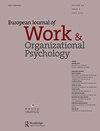午休期间体育锻炼和正念作为内部工作恢复策略的不同效果:一项日常研究
IF 3.4
2区 心理学
Q2 MANAGEMENT
European Journal of Work and Organizational Psychology
Pub Date : 2023-04-18
DOI:10.1080/1359432X.2023.2198706
引用次数: 0
摘要
摘要:本研究旨在确定午餐休息期间的日常活动(在进食前进行)是否与从工作压力中恢复的几个指标的改善有关。目前还没有研究检验静坐冥想和午餐休息时进行的有氧体育锻炼作为日常内部工作恢复活动的日常效果。这项三臂随机对照试验在22个工作日内进行,参与者为服务业工作者(n = 94,平均年龄46.8岁)。该随机对照试验注册于ClinicalTrials.gov,识别号:NCT03728062。正念组接受以正念为基础的干预(静坐冥想),而体育锻炼组进行有氧运动,间隔时间与正念组相同(15-30分钟);第三组是对照组。我们测量了每天对疲劳、心理疏离、睡眠质量、压力症状和注意力问题的影响。日常变量的测量是通过一个特别的App收集的。增长曲线分析显示,正念和体育锻炼可以有效地减少疲劳、压力。本文章由计算机程序翻译,如有差异,请以英文原文为准。
Differential efficacy of physical exercise and mindfulness during lunch breaks as internal work recovery strategies: a daily study
ABSTRACT This study aims to identify whether daily activities during the lunch break, performed before eating, are associated with improvements in several indicators related to recovery from work stress. No existing studies examine the daily effects of sitting mindfulness meditation and aerobic physical exercise practiced during lunch break as daily internal work recovery activities. This three-armed randomized controlled trial was carried out over 22 working days with service sector workers (n = 94, age mean, 46.8) The RCT was registered in ClinicalTrials.gov, Identifier: NCT03728062. The mindfulness group received a mindfulness-based intervention (sitting meditation), while the physical exercise group practiced an aerobic exercise program with the same time intervals as the mindfulness group (15–30 minutes); the third group was the control group. We measured daily effects on fatigue, psychological detachment, sleep quality, stress symptoms, and attention problems. Measurements of daily variables were collected through an ad hoc App. Growth curve analysis reveals that mindfulness and physical exercise can effectively reduce fatigue, stress boschphysicalBosch physical exercise significantly improved sleep quality.
求助全文
通过发布文献求助,成功后即可免费获取论文全文。
去求助
来源期刊
CiteScore
8.00
自引率
2.30%
发文量
40
期刊介绍:
The mission of the European Journal of Work and Organizational Psychology is to promote and support the development of Work and Organizational Psychology by publishing high-quality scientific articles that improve our understanding of phenomena occurring in work and organizational settings. The journal publishes empirical, theoretical, methodological, and review articles that are relevant to real-world situations. The journal has a world-wide authorship, readership and editorial board. Submissions from all around the world are invited.

 求助内容:
求助内容: 应助结果提醒方式:
应助结果提醒方式:


